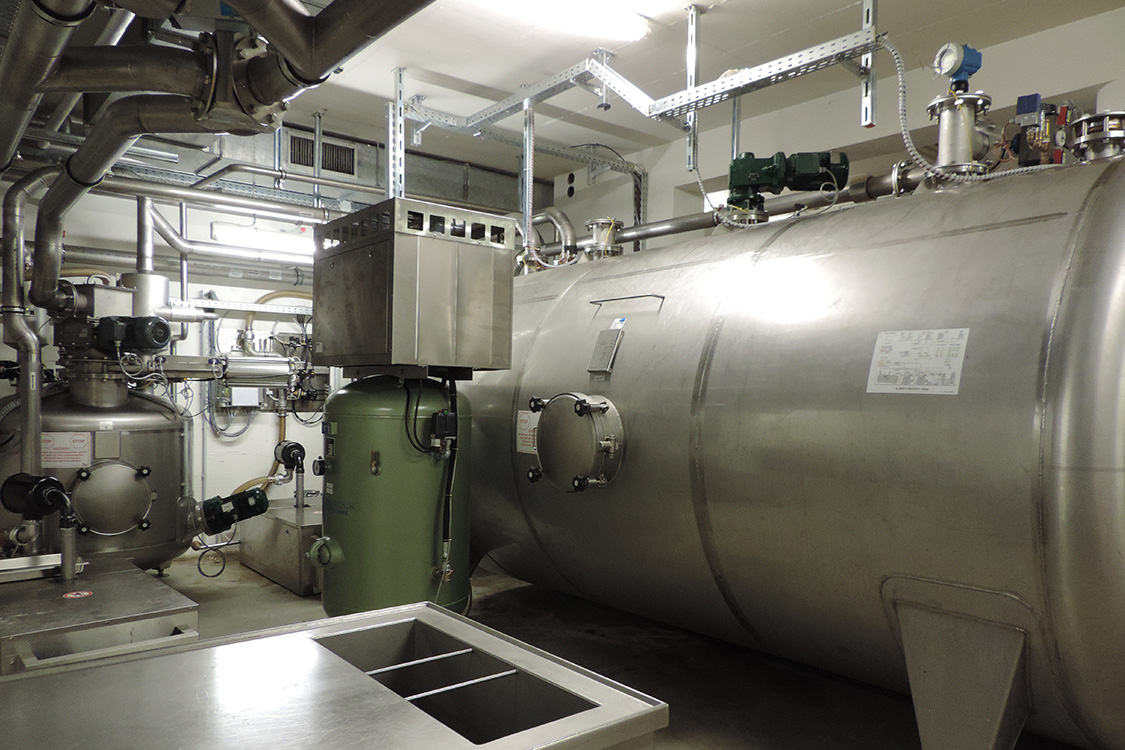Sustainability
- with MSC certificate,
- fair trade,
- with regional origin as well as
- from species-appropriate animal farming are used.
NEW: OUR REUSABLE CUPS
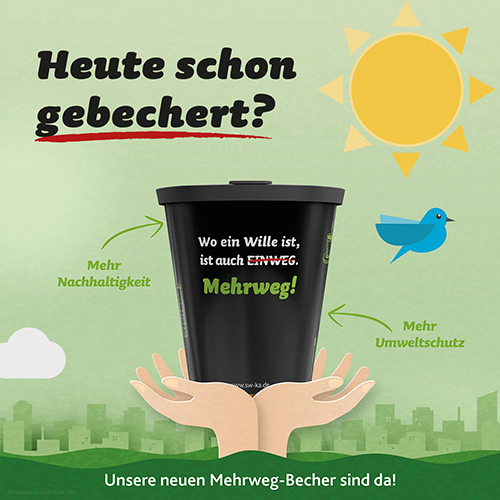
REUSABLE
Cafeteria am Adenauerring
[pizza]werk® Mensa am Adenauerring
Cafeteria Moltkestraße 30
Cafebar Moltke
Menseria Erzbergerstraße
Menseria Schloss Gottesaue
Cafeteria Engesserstraße
Cafeteria Bismarckstraße
Cafebar am ZirkelPforzheim:
Cafeteria Tiefenbronner Straße
Mensa HolzgartenstraßeContact and opening hours of the facilities can be found on our website here.
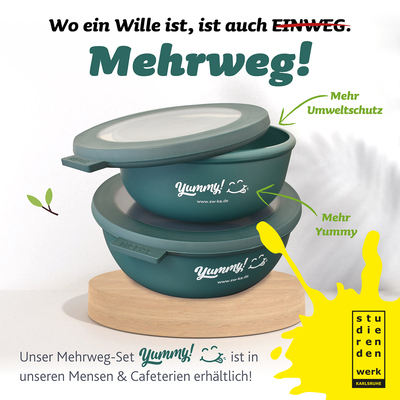
THE ENVIRONMENTAL SCORE: TRANSPARENCY IN TERMS OF SUSTAINABILITY
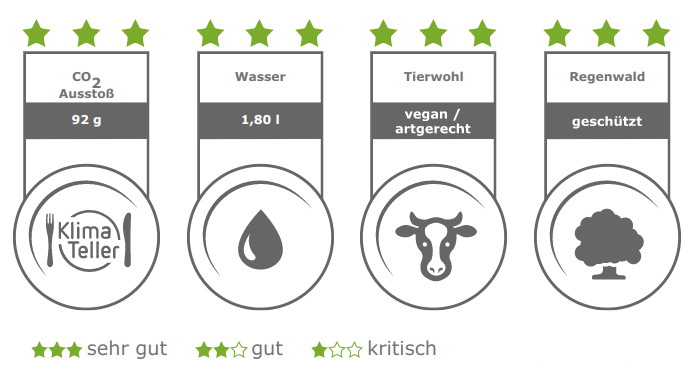 The detailed areas are rated with 1-3 stars. This information can be viewed on our menus per dish.Climate:
The detailed areas are rated with 1-3 stars. This information can be viewed on our menus per dish.Climate:Depending on the level of CO₂ emissions in grams, stars are awarded. (File no longer available for download!) If consumption is particularly low (3 stars), the "Klimateller" is also awarded.Important: We rate the dishes/products independently of the portion size. This means that even if a portion is smaller, this does not automatically mean that the CO₂ emissions will be lower.Water:
Depending on the consumption in litres, 1-3 stars are awarded. Particularly low consumption is marked with 3 stars.Animal welfare:
| s |
| s |
In calculating the environmental score, CO₂ emissions are taken into account as the crucial parameter in the food production system. Compared to the other metrics - water, animal welfare and rainforest - the reduction of greenhouse emissions has the greatest impact on improving the sustainability of a dish or increasing the careful use of our resources.In order to include the scientifically measured planetary boundaries, the parameter CO₂ emissions is included in the calculation of the environmental score of our dishes with a weighting factor of 50%. The three other parameters - water, animal welfare and rainforest - share the remaining 50%.
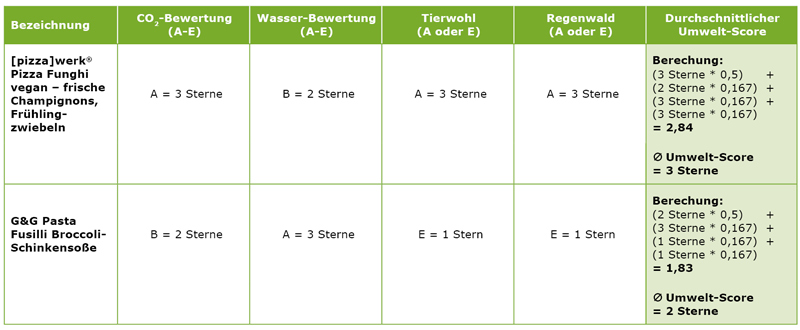 Rounding up and down the average environmental score:
Rounding up and down the average environmental score:> 0.50 = round up
< 0.49 = round downExamples:
1.25 = round down to 1 star
1,50 = round up to 2 stars
1.75 = round up to 2 stars What is the KlimaTeller?
The KlimaTeller is an initiative of the non-profit NAHhaft e.V.

-
 Du verlässt nun die Webseite des Studierendenwerks Karlsruhe (sw-ka.de)
Du verlässt nun die Webseite des Studierendenwerks Karlsruhe (sw-ka.de)Bitte beachte, dass du auf die externe Webseite https://eaternity.org/foodprint/ weitergeleitet wirst, auf der deine personenbezogenen Daten anders verarbeitet werden als bei uns.
Ehe du mit „Ja, weiter“ dieser Verarbeitung zustimmst, solltest du hier nachlesen, was bei der externen Webseite zum Datenschutz zu beachten ist.
-
Klick Here for the press article 2022_04_22_GVManager_UmweltScore im Studierendenwerk Karlsruhe.
 Du verlässt nun die Webseite des Studierendenwerks Karlsruhe (sw-ka.de)
Du verlässt nun die Webseite des Studierendenwerks Karlsruhe (sw-ka.de)Bitte beachte, dass du auf die externe Webseite https://www.youtube.com/watch?v=iK1iaBxViaQ weitergeleitet wirst, auf der deine personenbezogenen Daten anders verarbeitet werden als bei uns.
Ehe du mit „Ja, weiter“ dieser Verarbeitung zustimmst, solltest du hier nachlesen, was bei der externen Webseite zum Datenschutz zu beachten ist.
MENSA TO PACK
If you would like to have your meal TO PACK, all you have to do is inform the food counter. You will then receive the meal on reusable dishes and can transfer it at the packaging stations set up.In order to further reduce packaging waste, we offer a high-quality reusable bowl set for sale in our facilities, which you can use, for example, for your Mensa meal TO PACK. The bowl set consists of a 750 ml and a 1250 ml bowl and is available at a set price of 12.95 € in the following facilities:Karlsruhe:
Cafeteria am Adenauerring
[pizza]werk® Mensa am Adenauerring
Cafeteria Moltkestraße 30
Cafebar Moltke
Menseria Erzbergerstraße
Menseria Schloss Gottesaue
Cafeteria Engesserstraße
Cafeteria Bismarckstraße
Cafebar am ZirkelPforzheim:
Cafeteria Tiefenbronner Straße
Mensa HolzgartenstraßeContact and opening hours of the facilities can be found on our website here.

TOO GOOD FOR THE BIN
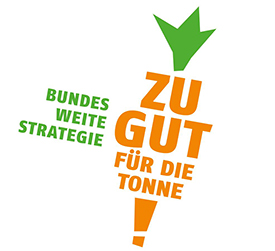
AWARD: "GOLDEN EGG"
ALTERNATIVE COOLING
FACTS:
- Construction period: 2012 to 2013
- Commissioning: 2013
SPECIFICATIONS:
- Base: combination of liquid ice, propane and CO2
- Liquid ice: 25% ice, 75% liquid (water with approx. 8% ethanol)
- Production: 6 ice generators with 14 kW cooling capacity each
- Distribution: 3km pipe network to 90 delivery points
- Propane gas: natural refrigerant R290 for normal refrigeration
- CO2: transforms the liquid ice temperature from -3.5°C to -25°C
- Tank volume: total 40m³
- Investment: approx. 1 million euros
Partner:
- Scientific support: Prof. Dr. Michael Kauffeld, University of Applied Sciences Karlsruhe
- Planning: Günther Schmidt Engineering Office, Hochheim
- Implementation: Hafner-Muschler, Balingen / IBV, Tiefenbach
- Funding: Ministry of Science, Research and the Arts / Vermögen und Bau Baden-Württemberg
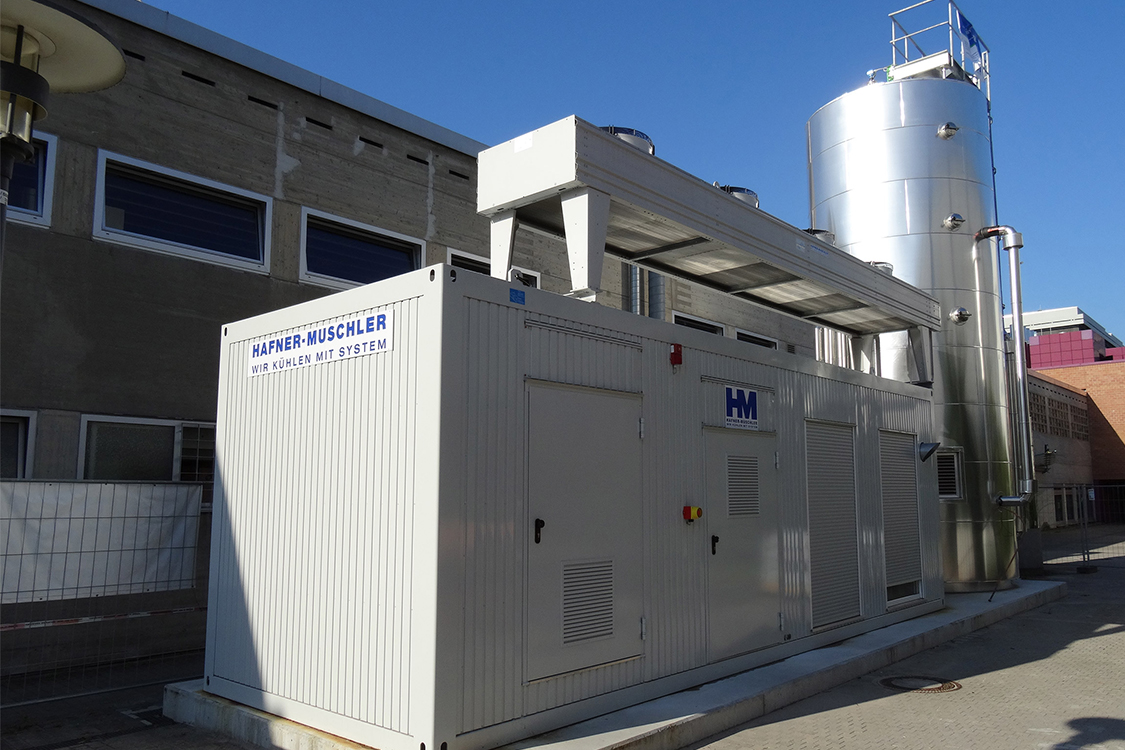
WET WASTE DISPOSAL
- Construction time: 6 weeks
- Commissioning: 2011
- Redundant wet waste disposal plant: System with one central tank and two independently operating disposal plants.
- Planning: vtechnik, Gaggenau
- Implementation: Meiko, Offenburg
- Funding: Ministry of Science, Research and the Arts / Property and Construction Baden-Württemberg
